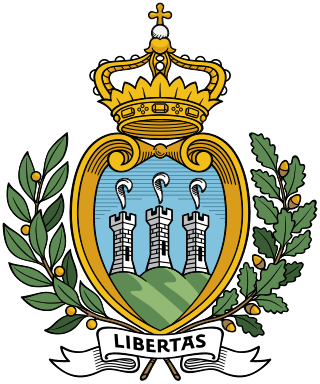
In political science, an initiative is a means by which a petition signed by a certain number of registered voters can force a government to choose either to enact a law or hold a public vote in the legislature in what is called indirect initiative, or under direct initiative, where the proposition is put to a plebiscite or referendum, in what is called a Popular initiated Referendum or citizen-initiated referendum.

San Marino elects on the national level a legislature. The Grand and General Council has 60 members, elected for a five-year term by semi-proportional representation with national majority bonus.
Voting in Switzerland is the process by which Swiss citizens make decisions about governance and elect officials. The history of voting rights in Switzerland mirrors the complexity of the nation itself. The polling stations are opened on Saturdays and Sunday mornings but most people vote by post in advance. At noon on Sunday, voting ends and the results are usually known during the afternoon.

Referendums are held only occasionally by the Government of New Zealand. Referendums may be government-initiated or held in accordance with the Electoral Act 1993 or the Citizens Initiated Referenda Act 1993. Nineteen referendums have been held so far. Fourteen were government-led, and five were indicative citizen initiatives.
Twelve national referendums were held in Switzerland during 2012. On 11 March voters across the country were asked five questions on employment leave, second houses, building society savings, the Fixed Book Price Agreement and gambling revenues. On 17 June there were three questions on healthcare, foreign policy and home buying. On 23 September there were three on a smoking ban, secure housing in old age and music lessons at school. A final referendum was held on 25 November on the Animal Diseases Act.
A referendum on federal salaries was held in Switzerland on 28 May 1933. Voters were asked whether they approved of a federal law that would lower the salaries of federal officials on a temporary basis. The proposal was rejected by 55.1% of voters.

A referendum on repealing changes made to the law on the sale of public property was held in San Marino on 27 March 2011. It was approved by 12,166 voters, passing the 32% quorum of registered voters (10,522) required.

The 1906 San Marino citizenry meeting was a session of the Arengo in San Marino. It was the first such meeting in three centuries. It ended oligarchic rule and resulted in the first modern democratic elections in the country.

A constitutional referendum was held in Uruguay on 26 November 1989 alongside general elections. The proposed changes to the constitution would require state pensions to be increased at the same rate as the salary of civil servants. The proposal was approved by 81.78% of those voting and 72.51% of all registered voters.

A four-part referendum was held in the Federated States of Micronesia on 1 July 1999. Voters were asked whether a constitutional convention should be called, whether they approved of a proposal on the distribution of revenues from the country's exclusive economic zone (EEZ), whether the amount of tax revenues distributed to the states should rise from 50% to 70%, and whether states should be given exclusive ownership of their natural resources. The latter three had originally been planned to be held alongside the parliamentary elections in March, but were postponed due to a lack of funds to print the ballot papers.

A three-part referendum was held in the Northern Mariana Islands on 6 November 1993. Voters were asked whether they approved of two constitutional amendments regarding collective land ownership of native islanders and the veto powers of the Governor, and whether a Constitutional Convention should be elected. All three proposals were approved by voters.
Eleven national referendums were held in Switzerland during 2013. Voters approved six proposals related to spatial planning, executive pay, family policy, amendments to the laws on asylum and epidemics and an increase in the length of petrol station shop opening hours. The other five proposals on directly electing the Federal Council, abolishing compulsory military service, limiting salaries in a company to 12 times the lowest paid worker, tax credits for stay-at-home parents and an increase in road tax were rejected.
The Thirty-second Amendment of the Constitution Bill 2013 was a proposal to amend the Constitution of Ireland to abolish Seanad Éireann, the upper house of the Irish parliament, the Oireachtas. The proposal was rejected by the electorate in a referendum on 4 October 2013 by 51.7% voting against to 48.3% in favour.

A three-part constitutional referendum was held in the Northern Mariana Islands on 1 November 1997. All three proposals were approved by voters.

Two referendums were held in San Marino on 20 October 2013. Voters were asked whether they approved of measures to tie salary increase to inflation and whether the country should submit an application to join the European Union. Although both proposals had a majority vote in favour, neither reached the quorum of 32% of registered voters in favour, resulting in both proposals being rejected.
A referendum is a direct vote in which an entire electorate is asked to either accept or reject a particular proposal. This article summarises referendum laws and practice in various countries.
A four-part referendum on alcohol was held in the Faroe Islands on 6 November 1907. Voters were asked whether they approved of the trading and serving of beer, wine and spirits. All four proposals were rejected by voters. Following the referendum, prohibition was introduced in 1908 on all beverages with an alcohol content above 2%. An attempt in 1973 to overturn this ban was rejected in another referendum, but it was eventually lifted in 1992.

A nineteen-part referendum was held in the Northern Mariana Islands on 2 March 1996. Voters were asked whether they approved of constitutional amendments of each chapter, with a separate vote on each. All amendments were rejected.

A two-part constitutional referendum was held in Mauritania on 5 August 2017, having initially been planned for 15 July. Voters were asked whether they approve of proposed amendments to the constitution. Both proposals were approved by 86% of voters with a voter turnout of 54%.
A referendum on anti-corruption measures was held in Colombia on 26 August 2018. Voters were asked whether they approve of seven proposals aimed at reducing corruption: limiting the number of terms for politicians at all levels to three; requiring election candidates disclose their assets and those of their relatives; elected politicians being required to disclose their activities and private interests; a requirement for public hearings on budgets; a requirement for all public sector contracts to go out to tender; the removal of the right to parole for people convicted of corruption; and reducing the maximum salary of public officials and politicians from forty times the minimum wage to twenty-five times.







